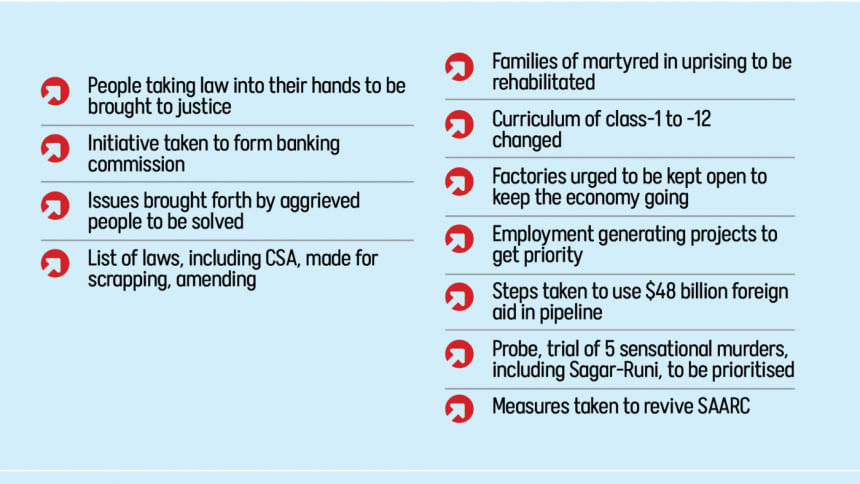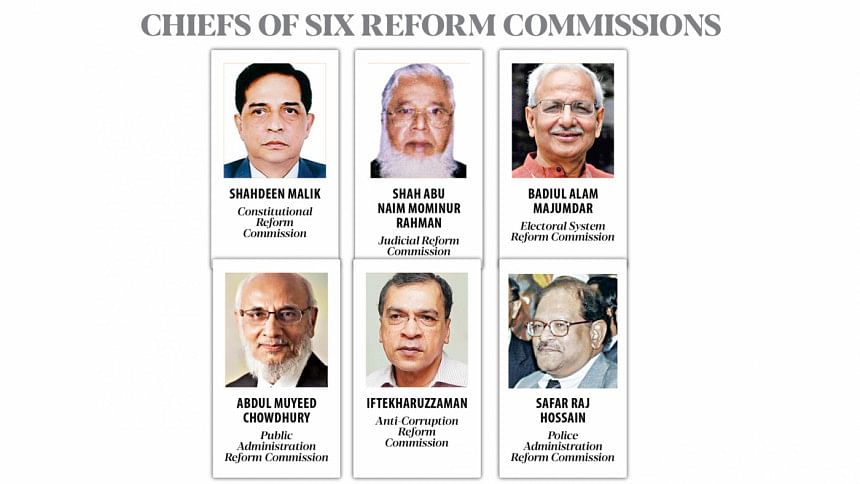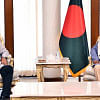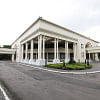Yunus charts a path to reforms
The interim government has decided to form six commissions to reform the judiciary, election system, administration, police, Anti-Corruption Commission, and the constitution, said Chief Adviser Prof Muhammad Yunus in his address to the nation yesterday.
The aim of the reforms is to have a state system based on public ownership, accountability, and welfare, he said.

It has become essential to carry out some national reforms to prevent re-emergence of fascism or authoritarian rule in Bangladesh, said the Nobel laureate.
At the core of these reforms is the establishment of a fair electoral system and good governance, he said.
The chief adviser said Shahdeen Malik would lead the Constitutional Reform Commission; Justice Shah Abu Naim Mominur Rahman the Judicial Reform Commission; Badiul Alam Majumdar the Election System Reform Commission; Abdul Muyeed Chowdhury the Public Administration Reform Commission; Safar Raj Hossain the Police Administration Reform Commission; and Iftekharuzzaman the Anti-Corruption Reform Commission.
These commissions are expected to formally start their work from October 1 and finish their jobs within the next three months. The heads of the bodies would determine the commission members, he said in his 32-minute speech.
Yunus said based on the commissions' reports, the interim government will organise discussions with major political parties in the next phase. At the final stage, a comprehensive consultation will be held for three to seven days with representatives from student bodies, civil society, political parties, and the government.

"This discussion will finalise the outline of the reform plan and provide an idea on how it will be implemented," he said.
The chief adviser said, "We believe that imposing the dominance of the majority or misrule on the people under the guise of elections or concentrating all power in the hands of one person, family, or group, is unacceptable.
"To prevent these, the government is thinking of reforms related to the election commission and other institutions involved in elections."
Reforming the four institutions related to the electoral process -- the police, public administration, judiciary, and the Anti-Corruption Commission -- is essential for free and fair elections, he said.
Additionally, the interim government feels the need for constitutional reforms to ensure the representation and interests of all layers of society and to reflect the message of the July uprising, he said.
"We seek reforms. Our sincere request is that you not retreat to the spectators' gallery after entrusting us with the heavy responsibility of reforms. Stay with us. We will reform together. It is everyone's responsibility. Bring reform to your own field," Yunus said, adding that the reform of a nation is not just the reform of the government.
Given the reality, the interim government might not have made headway at the desired speed during its first month in office.
"If we can maintain law and order in the country, we hope to gain significant momentum. Therefore, we seek the cooperation of all…our task is very difficult, but as a nation, we cannot afford to fail this time. We must succeed.
"I will not ask you to be patient. We are all growing impatient, wondering when all this work will be completed. We will lose patience. Why wouldn't we? But we will work correctly. We will leave no sign of impatience in our work."
Yunus called upon workers and owners to keep their factories open to keep the economy afloat.
"You should keep the factories running. Keep the wheels of the economy turning. Let the country's economy stand strong."
Addressing the plight of the workers, the head of the interim government said shutting down the factories will not solve problems. "We will most certainly resolve the problem through discussions between workers and factory owners."
He also urged factory owners to reach an understanding with the workers to ensure the factories remain operational.
"In the garment and pharmaceutical industries, workers have continuously halted operations to voice their complaints. This will inevitably have a negative impact on our economy, which we cannot afford."
The economy the interim government inherited was largely unregulated and rapidly deteriorating. Institutional structures were almost destroyed, and foreign currency reserves hit rock bottom, he said.
"We are trying to inject life into this economy, and we are getting some positive results. But if our industries and factories shut down now, it will severely damage the economy, which is something no one wants."
Yunus said the recent flash floods again revealed the incredible empathy of the people.
He thanked the armed forces for their roles during all disasters as well as in ensuring justice and stability.
BLACK LAWS, MEDIA COMMISSION
The chief adviser said the interim government is considering forming a media commission to ensure that the media can operate freely.
"Freedom of the press and freedom of expression have already been assured. We have made it clear that everyone should criticise us openly. We respect all opinions."
He said false cases and those filed with intent to harass people under the Anti-Terrorism Act, Digital Security Act, and Cyber Security Act were being withdrawn.
A list of repressive laws, including the Cyber Security Act, has been prepared, and these laws will soon be repealed or amended, Yunus said.
"Assistance is being provided to expedite investigations and trials of five sensational murder cases, including the killing of journalist couple Sagar and Runi," he said.
RELATIONSHIP WITH INDIA, OTHER COUNTRIES
"We seek good relations with India and other neighbouring countries, but those relations must be based on fairness and equality."
In an effort to increase regional cooperation, an initiative to revive SAARC has been taken.
"The country's planning should be centred on the people, not on any leader or party."
To maintain a steady supply of essentials, meetings have been held with business leaders, industrialists, and business associations, and various measures are being implemented based on their feedback, he said.
Instructions have been issued to the NBR to reduce existing tariffs on some essential commodities, such as onions and potatoes, to lower their prices.
He thanked President Sheikh Mohammed bin Zayed Al Nahyan of the UAE for pardoning 57 Bangladeshis who had been jailed for participating in anti-fascist protests.
'NONE SHOULD HARM HARMONY'
Yunus said the government is determined to create a democratic framework for the country.
"We must ensure that we never fall into the hands of a dictator again and that we can proudly say we live in a democratic country. We are working towards ensuring that everyone can claim this country as theirs.
"No one should take the law into their own hands. If anyone creates chaos by doing so, we will certainly bring them to justice. We are a country of communal harmony. No one should engage in any action that would harm religious harmony in any way."
REBUILDING PUBLIC ADMIN
All necessary initiatives have been taken to make the field administration people-friendly, free from corruption, and accountable.
The government started its journey with a devastated public administration. Many top officials in the ministries have resigned or were unable to work due to pressure from their colleagues, and some were forced to resign.
The officials forced to resign during the previous regime or compelled to remain in the same position without responsibilities have been considered in the government's efforts to rebuild public administration.
Resolving all issues and establishing a new public administration structure is the greatest achievement in the first month of the government, he said, adding, "I believe this public administration will make the greatest contribution to fulfilling the will of the people."
A total of 135 additional secretaries, 227 joint secretaries, and 120 deputy secretaries have been promoted.
He said government employees now have to submit a declaration of their assets every year.
The government has taken the initiative to build a new Bangladesh as an environmentally friendly and biodiversity-rich nation.
"We have also undertaken efforts to halt river pollution … ," he said.

 For all latest news, follow The Daily Star's Google News channel.
For all latest news, follow The Daily Star's Google News channel. 








Comments